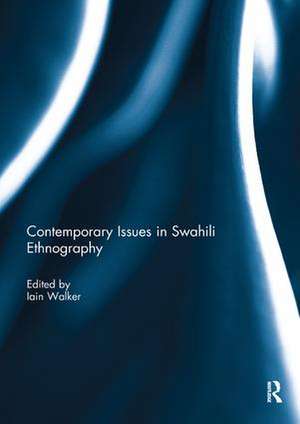Contemporary Issues in Swahili Ethnography
Editat de Iain Walkeren Limba Engleză Paperback – 27 sep 2018
This collection brings together anthropologists working on the greater Swahili world and the issues it confronts, dealing with societies from southern Somalia, northern Mozambique and the Comoro Islands, to Zanzibar and Mafia. The authors discuss a range of contemporary issues such as the shifting roles of Islam on the mainland coast; consumerism, conservation, memory and belonging in Zanzibar; how a Muslim society deals with HIV/AIDS; social change, development and political strategies in the Comoros; and Swahili women in London. The diversity of these themes reflects the diversity of the Swahili world itself: despite a cohesive cultural identity built upon shared practices, religious beliefs and language, the challenges facing Swahili people are multiple and complex.
This book comprises articles originally published in the Journal of Eastern African Studies along with some new chapters.
| Toate formatele și edițiile | Preț | Express |
|---|---|---|
| Paperback (1) | 298.41 lei 6-8 săpt. | |
| Taylor & Francis – 27 sep 2018 | 298.41 lei 6-8 săpt. | |
| Hardback (1) | 877.19 lei 6-8 săpt. | |
| Taylor & Francis – 28 feb 2017 | 877.19 lei 6-8 săpt. |
Preț: 298.41 lei
Preț vechi: 341.00 lei
-12% Nou
Puncte Express: 448
Preț estimativ în valută:
57.10€ • 58.100$ • 47.50£
57.10€ • 58.100$ • 47.50£
Carte tipărită la comandă
Livrare economică 19 martie-02 aprilie
Preluare comenzi: 021 569.72.76
Specificații
ISBN-13: 9780367132873
ISBN-10: 0367132877
Pagini: 230
Dimensiuni: 174 x 246 mm
Greutate: 0.4 kg
Ediția:1
Editura: Taylor & Francis
Colecția Routledge
Locul publicării:Oxford, United Kingdom
ISBN-10: 0367132877
Pagini: 230
Dimensiuni: 174 x 246 mm
Greutate: 0.4 kg
Ediția:1
Editura: Taylor & Francis
Colecția Routledge
Locul publicării:Oxford, United Kingdom
Public țintă
PostgraduateCuprins
1. Introduction Iain Walker 2. Medicines of hope? The tough decision for anti-retroviral use for HIV in Zanzibar, Tanzania Nadine Beckmann 3. ‘It’s not Islamic!’ Changing debates about what it means to be a good Muslim on Mafia Island, Tanzania Pat Caplan 4. Attempts at fusion of the Comorian educational systems: religious education in Comorian and Arabic and secular education in French Damir Ben Ali 5. Transmission of Muslim practices and women's agency in Ibo Island and Pemba (Mozambique) Francesca Declich 6. Reinterpreting revolutionary Zanzibar in the media today: The case of Dira newspaper Marie-Aude Fouéré 7. Integration and identity of Swahili speakers in Britain: case studies of Zanzibari women Ida Hadjivayanis 8. Constructing translocal socioscapes: consumerism, aesthetics, and visuality in Zanzibar Town Paola Ivanov 9. One hundred years in Brava: The migration of the Umar Ba Umar from Hadhramaut to East Africa and back, c. 1890-1990 Alessandra Vianello 10. Is social capital fungible? The rise and fall of the Sanduk microcredit project in Ngazidja Iain Walker 11. Chasing imaginary leopards: science, witchcraft and the politics of conservation in Zanzibar Martin Walsh and Helle Goldman
Notă biografică
Iain Walker is Research Officer in the Centre for Interdisciplinary Area Studies, Martin
Luther University, and Associate at the Max Planck Institute for Social Anthropology in
Halle, Germany. He has worked on a variety of themes in the Comoro Islands as well as
on migration, disapora, identity and belonging among Comorians and Hadramis in the
Western Indian Ocean.
Luther University, and Associate at the Max Planck Institute for Social Anthropology in
Halle, Germany. He has worked on a variety of themes in the Comoro Islands as well as
on migration, disapora, identity and belonging among Comorians and Hadramis in the
Western Indian Ocean.
Descriere
The term ‘Swahili’ describes the Muslim peoples of the East African coast. In this volume, the authors discuss a range of contemporary issues: the shifting roles of Islam on the mainland coast; consumerism, conservation, memory and belonging in Zanzibar; how a Muslim society deals with HIV/AIDS; social change, development and political strategies in the Comoros; and Swahili women in London. This reflects the diversity of the Swahili world: despite a cohesive cultural identity built upon shared practices, religious beliefs and language, the challenges facing Swahili people are multiple and complex. This book includes articles first published in the Journal of Eastern African Studies.
